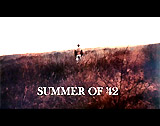
|
Summer of '42 (1971)
In director Robert Mulligan's bittersweet, melancholy,
war-time, New England beachside summer romance and coming-of-age
tale, it featured Michel Legrand's recognizable, Oscar-winning dramatic
score, some soft-focus cinematography, and an Academy Award nomination
for Herman Raucher's Best Screenplay:
- the setting for the rites-of-passage romantic drama
was the nostalgic atmosphere of 1940s Nantucket Island, seen in
flashback 30 years later; it was
narrated (with opening and closing comments) by the grown-up adult
version of young, sensitive minded 15 year-old teenager Herman
"Hermie" Raucher (Gary Grimes)
- during the summer of 1942, a time of war, Hermie
and his two teenaged friends were vacationing with their families
- visiting the island off the Eastern seaboard; a trio of sex-obsessed
male friends included Hermie, the group's leader Oscar "Oscy" Seltzer (Jerry
Houser) and nerdy, shy and immature Benjie (Oliver Conant); they
often expressed their sexual awkardness and desire to lose their
virginity, and perused sexual manuals to learn about sexual intercourse
(and how to achieve it in 12 steps)
- Hermie hopelessly fell in love, at a distance with
a neighbor - beautiful 22 year-old, newly-married war
bride Dorothy (Jennifer O'Neill); he became acquainted with her
by helping her to carry groceries, and by performing chores (such
as moving boxes into the attic), after her recently-drafted husband
departed for the war front
- during a night at the movies (watching the romantic
drama Now, Voyager (1942)), Hermie
was with Aggie (Katherine Allentuck), while Oscy chose to accompany
flirtatious Miriam (Christopher Norris); Benjie was too fearful of
the opposite sex to stick around; during the film's screening, both
Hermie and Oscy awkwardly made out with their young dates; humorously, Hermie
wrongly believed he was stroking his date's breast, but it was actually
her arm
- in one comic vignette, in preparation for a beach
marshmallow roast (and possible sexual contact with their dates),
Hermie was coaxed into nervously purchasing a condom from an unsympathetic
storeowner
- a tearjerking romance and sexual
awakening occurred for Hermie when he visited Dorothy one evening;
as he entered the dimly-lit house, a phonograph needle was stuck
on a record; in the living room, he noticed a bottle of alcohol and
a glass, and an ashtray stuffed with cigarette butts; he discovered
that Dorothy had just learned via a government telegram
that her husband had been killed in action (his plane
was shot down over France)
- with tears in her eyes
and slightly drunk, she put her head on Hermie's shoulder, and slowly
danced (barefooted) with him to the tune (the film's theme song)
playing on a phonograph record; she also tenderly kissed him a
few times
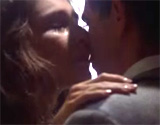
|
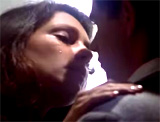
|
|
Tender Kisses Between Hermie and Dorothy
|
- after kissing him (as the phonograph
needle reached the end of the record), with only the sound of the waves
on the soundtrack, she wordlessly beckoned him; she took him by the
hand, and led him to her bedroom for comfort; she slowly removed
her white slip over her head, prepared the bed, and then removed
her bra and panties before they gently entered her bed naked together
- when Hermie left her later that evening, she was
outside on the porch in a robe, smoking a cigarette; she gave him
a simple "Good night, Hermie" - and that was the last time
he saw her
- the next day, when Hermie returned to Dorothy's beach
house, he saw that she had left a note for him (inside an envelope
attached to the front door); he sat down on the porch to read it;
she explained (in voice-over) that perhaps the meaning of the event
would come to him in time, and she hoped that he would not face senseless
tragedies in his life: ("Dear
Hermie: I must go home now.
I'm sure you'll understand. There's much I have to do. I won't try and explain
what happened last night because
I know that, in time, you'll find a proper way in which to remember
it. What I will do is remember you. And I pray that you be spared
all senseless tragedies. I wish you good things, Hermie. Only good
things. Always, Dorothy"),
to the swelling sounds of Michel Legrande's theme music
- the final bitter-sweet and sentimental voice-over came from the Narrator,
middle-aged Herman Raucher (voice of Robert Mulligan), as he thought
back to that fateful summer of 1942: "I
was never to see her again. Nor was I ever to learn what became of
her. We were different then. Kids were different. It took us longer
to understand the things we felt. Life is made up of small comings
and goings. And for everything we take with us, there is something
that we leave behind. In the summer of '42, we raided the Coast Guard
station four times, we saw five movies, and had nine days of rain.
Benji broke his watch, Oscy gave up the harmonica, and in a very
special way, I lost Hermie forever"
|

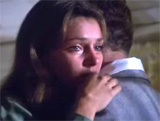

Slow-Dancing: Hermie with Dorothy
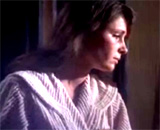
"Good night, Hermie"
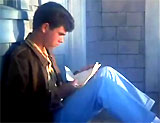
Dorothy's Note Left for Hermie

Film's Ending - Last Look at the Beach House
|







